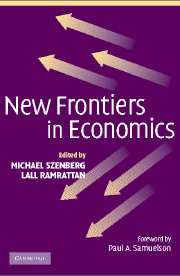Book contents
- Frontmatter
- Contents
- List of Contributors
- Foreword by Paul A. Samuelson
- Preface
- Acknowledgments
- Introduction
- PART I INFORMATIONAL BEHAVIORAL ECONOMICS AND FINANCE
- PART II MACROECONOMICS AND PUBLIC POLICIES
- PART III INTERNATIONAL TRADE AND DEVELOPMENT
- PART IV CONTRACTS, LAW, AND GAMING
- 9 Contract or War? On the Consequences of a Broader View of Self-Interest in Economics
- 10 New Directions in Law and Economics
- Author Index
- Subject Index
- References
9 - Contract or War? On the Consequences of a Broader View of Self-Interest in Economics
Published online by Cambridge University Press: 06 July 2010
- Frontmatter
- Contents
- List of Contributors
- Foreword by Paul A. Samuelson
- Preface
- Acknowledgments
- Introduction
- PART I INFORMATIONAL BEHAVIORAL ECONOMICS AND FINANCE
- PART II MACROECONOMICS AND PUBLIC POLICIES
- PART III INTERNATIONAL TRADE AND DEVELOPMENT
- PART IV CONTRACTS, LAW, AND GAMING
- 9 Contract or War? On the Consequences of a Broader View of Self-Interest in Economics
- 10 New Directions in Law and Economics
- Author Index
- Subject Index
- References
Summary
The first principle of Economics is that every agent is actuated only by self-interest. The workings of this principle may be viewed under two aspects, according as the agent acts without, or with, the consent of others affected by his actions. In wide senses, the first species of action may be called war; the second, contract.
[Edgeworth (1881), pp. 16, 17; emphasis in the original.]INTRODUCTION
Edgeworth's characterization, made more than a century ago, of the species of actions called “war” appears rather benign; yet the prominent British marginalist proceeded to examine only the case of contract. He left the analytical study of war itself and, perhaps more importantly, the study of what leads to contract and what leads to war for others to pursue. In the intervening years, however, very few economists have followed such a line of inquiry. The study of war – broadly construed – has fallen mostly into the hands of political scientists. The synthetic, integrated study of war and contract has also been claimed by scholars of political science and other social scientists, but not by economists.
In fact, many economists today would cringe at the idea that homo economicus – instead of just trucking, bartering, and trading – could also beat, cheat, and steal from others. On a closer look, the notion of homo economicus is a bit puzzling in what it requires of a human being: he or she will haggle to death to get a better price, though never think about grabbing what the other person has if given the chance to do so.
- Type
- Chapter
- Information
- New Frontiers in Economics , pp. 261 - 280Publisher: Cambridge University PressPrint publication year: 2004
References
- 2
- Cited by

